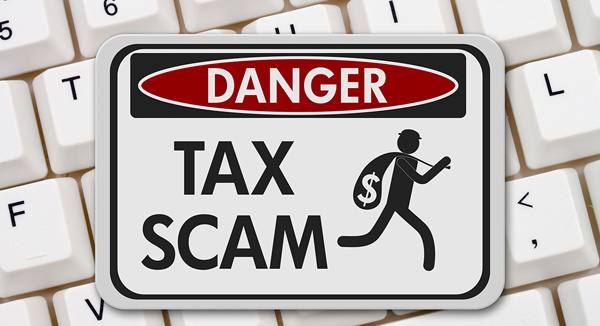Each year, Americans lose billions of dollars to tax scams. They can range from your grandmother getting a bogus call the she owes money or scammers filing fraudulent claims using your Social Security number.
Each year, the IRS releases a list of the “Dirty Dozen” tax scams to watch out for during tax season. This year’s list, shown below, includes classic scams as well as some new twists. Here are the twelve tax scams as identified by the Internal Revenue Service.
1. Identity Theft – Tax time brings extra activity among thieves looking for Social Security numbers and other personal information that allows them to falsely claim refunds (not to mention running up bills and draining bank accounts). Be very protective of your personal information. Let MoneyTips protect your credit and your identity with a free trial.
4. Preparation Fraud – Some tax preparers bend the rules in order to get you the highest refund possible. Unfortunately, once you sign and file the return, you are responsible for any errors. If you choose to have others do your taxes, be sure to use a reputable tax preparer. “The number one thing is finding someone who is honest and has integrity,” advises Betterment Head of Tax Eric Bronnenkant. “It’s someone whom you’re trusting with all of your personal financial information, so that provision shouldn’t be taken lightly.”
5. Offshore Tax Avoidance – The IRS is cracking down on hiding money offshore to avoid tax payments. If you find yourself in this position, use the IRS’s Streamlined Filing Compliance Procedures (SFCP), the delinquent Report of Foreign Bank and Financial Accounts (FBAR) submission procedures, or the delinquent international information return submission procedures to make things right — or run the risk of severe penalties. The Offshore Voluntary Disclosure Program (OVDP), which closed on September 28, 2018, was the primary channel to make such disclosures in previous years. Since the program’s inception in 2009, the IRS received more than 56,400 disclosures and collected over $11.1 billion through the OVDP.
6. Inflated Refunds – Anyone who promises you a big refund without looking at your records first should be avoided. If it sounds too good to be true, guess what? It is.
7. Fake Charities – Before making your donation, check the IRS website to make sure that your donation is going to a qualified charitable organization. Look for knockoff organizations with names, websites, and logos that are similar to well-known legitimate organizations.
8. Padded Deductions/Credits – It’s really simple — do not claim larger deductions than you can justify through receipts or other paperwork. Similarly, make sure you meet eligibility requirements for any tax credits before attempting to claim them.
9. Excessive Business Credit Claims – The above advice goes for businesses as well. Do not claim credits like the research or fuel tax credit unless your business meets the qualifications for those credits.
10. Falsifying Income for Credits – Scam artists can suggest bending the income rules to qualify for tax credits that target lower-income taxpayers, such as the Earned Income Tax Credit. Do not give in to their claims. Never falsify income on a tax return for any reason, regardless of what anybody tells you.
11. Abusive Tax Shelters – By using complicated but authoritative-sounding language, tax scammers can fool people into thinking tax shelters are legitimate when they are not. Seek independent confirmation and outside advice on any scheme designed to limit or avoid taxes.
12. Frivolous Arguments – The IRS is too busy to waste time listening to your claims of being a sovereign nation and therefore enjoying immunity from taxes, or any similar outlandish claims on tax returns. Frivolous tax returns incur a $5,000 penalty, and failure-to-file penalties can end up being even worse.
Look out for these and other tax scams as you file your taxes this year. Healthy skepticism, relentless guarding of your personal information, and adherence to the rules can save you a lot of trouble as well as money.
 Metro Voice News Celebrating Faith, Family & Community
Metro Voice News Celebrating Faith, Family & Community









